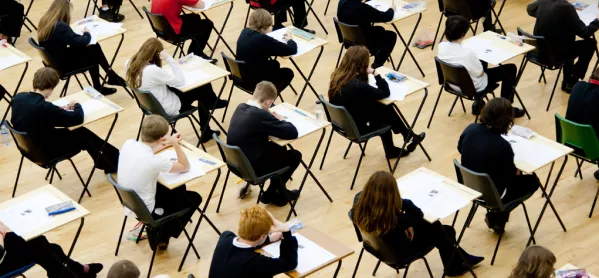- Home
- Exclusive: Teacher judgement may be key to 2021 GCSEs
Exclusive: Teacher judgement may be key to 2021 GCSEs

Teacher judgements of student performance are likely to play a key role in deciding next year’s GCSE and A-level grades, after all, Tes can reveal.
Education secretary Gavin Williamson has been clear that he thinks the grades should be decided by exams because they are “the fairest way of measuring a student’s abilities”.
But as the disruption caused by Covid-19 infections increases, the exams sector is having to consider alternatives - and Tes has learned that school rank orders of students in each subject could again play a big role.
Exclusive: 2021 GCSE grades could be even more generous
2021 exams: Autumn grades boosted by summer ‘generosity’
Exam options for 2021: Ofqual looking at multiple choice and mocks
A senior source close to the discussions about exams in 2021 said teachers’ judgements of student performance may be used next year, in order to produce a rank order of students in case of absence due to the coronavirus.
“For Plan B, where significant numbers of pupils are missing, the answer there would be that you just need rank orders,” they said.
Coronavirus: How will GCSE and A-level results be decided next year?
“Because if you get rank orders subject by subject, school by school, and then let’s say 80 per cent of your pupils take the exam, then for the 20 per cent who are ill, their results can be slotted in on the basis of the availability of the rank order,” they added.
“It’s one of the things that is being considered - it seems to me quite a good idea, because it’s simple.”
Geoff Barton, general secretary of the Association of School and College Leaders, said the idea was being discussed as an option for next year, and that it would give students more of a “safety net” if they did miss an exam.
“I think one of the lessons that’s probably been learned, which will be being looked at, is asking schools to rank order students,” he said.
“Now that’s slightly different from doing the CAGs [centre-assessed grades], where you were giving every child a grade. It’s basically what you were doing for every child in history in your school, saying, ‘We’ve got 120 students doing history - here is the rank order.’
“And what that then allows you to do with those young people is if one of those can’t sit a particular paper or can’t sit two or three papers, what the awarding organisation can do is say, ‘OK, well let’s have a look where they were in the school’s rank order. This kid ought to get a grade 5 instead of a grade 4 because of who’s immediately above and who’s immediately below.’
“I think there’s something in that - the question is how do you arrive at a rank order. You usually do that by saying what grade would you give them, so it would still involve teachers saying, ‘What grade might we think this child would get?’ But I think what you would submit is not centre-assessed grades, what you would submit is perhaps just a school’s rank order for every subject.
“You would leave the actual heavy lifting of who’s getting which grade to the exam board, but for the child who missed, it’s easy to slot them in because you can look at the child immediately above and immediately below.
“It just gives you a system that would provide the sense of a safety net to a young person - that if they did miss out on one of their papers, special consideration isn’t just sticking a finger in the air and saying, ‘What do we think she’s worth?’”
The education secretary has assured the public that exams will go ahead next year, although most GCSEs and A levels will be delayed by three weeks.
Using a rank order could ensure that if most students were able to sit exams, those who missed a paper from illness could have a grade “slotted” in between those above and below them in the rank order for that subject.
The government is still considering a range of options in order to mitigate the lost learning students have experienced ahead of the 2021 exams. Last week, schools minister Nick Gibb said GCSE and A-level grading would reflect the time students had lost out on next year.
Also last week, Tes reported that some senior sources felt that the GCSE and A-level grading in 2021 should be more generous than that in 2020, in order not to penalise students.
An Ofqual spokesperson said: “We are considering a range of potential contingency options, alongside measures to maximise the opportunity for students to take their exams. We will say more before the end of the year.”
Keep reading for just £1 per month
You've reached your limit of free articles this month. Subscribe for £1 per month for three months and get:
- Unlimited access to all Tes magazine content
- Exclusive subscriber-only stories
- Award-winning email newsletters



